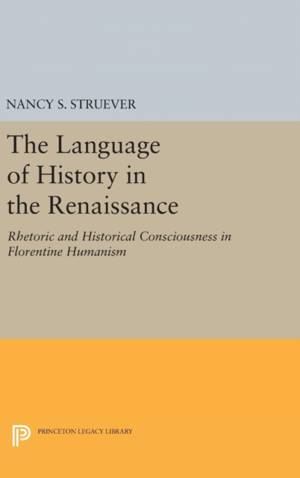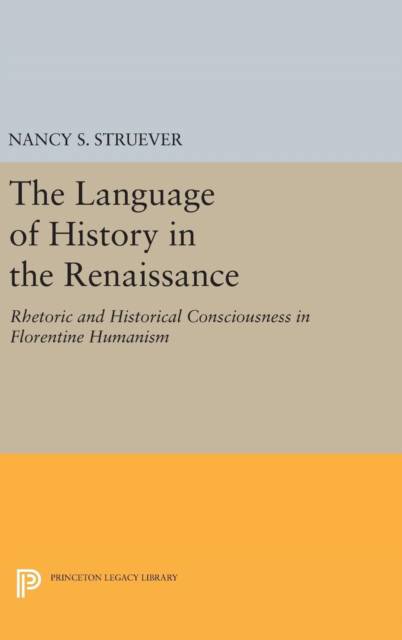
Door een staking bij bpost kan je online bestelling op dit moment iets langer onderweg zijn dan voorzien. Dringend iets nodig? Onze winkels ontvangen jou met open armen!
- Afhalen na 1 uur in een winkel met voorraad
- Gratis thuislevering in België vanaf € 30
- Ruim aanbod met 7 miljoen producten
Door een staking bij bpost kan je online bestelling op dit moment iets langer onderweg zijn dan voorzien. Dringend iets nodig? Onze winkels ontvangen jou met open armen!
- Afhalen na 1 uur in een winkel met voorraad
- Gratis thuislevering in België vanaf € 30
- Ruim aanbod met 7 miljoen producten
Zoeken
The Language of History in the Renaissance
Rhetoric and Historical Consciousness in Florentine Humanism
Nancy S Struever
€ 151,45
+ 302 punten
Uitvoering
Omschrijving
At any time, basic assumptions about language have a direct effect on the writing of history. The structure of language is related to the structure of knowledge and thus to the definition of historical reality, while linguistic competence gives insights into the relation of ideas and action.
Within the framework of these ideas, and drawing on recent work in linguistic theory, including that of the French structuralists. Professor Struever studies the major shift in attitudes toward language and history which the Renaissance represents. One of the essential innovations of Renaissance Humanism is the substitution of rhetoric for dialectic as the dominant language discipline; rhetoric gives the Humanists their cohesion as a lay intellectual elite, as well as the force and direction of their thought. The author accepts the current trend in classical studies, the rehabilitation of the Sophists which finds its source in Nietzsche and includes the work of Rostagni, Untersteiner, and Buccellato, to reinstate rhetoric as the historical vehicle of Sophistic insight. Originally published in 1970. The Princeton Legacy Library uses the latest print-on-demand technology to again make available previously out-of-print books from the distinguished backlist of Princeton University Press. These editions preserve the original texts of these important books while presenting them in durable paperback and hardcover editions. The goal of the Princeton Legacy Library is to vastly increase access to the rich scholarly heritage found in the thousands of books published by Princeton University Press since its founding in 1905.Specificaties
Betrokkenen
- Auteur(s):
- Uitgeverij:
Inhoud
- Aantal bladzijden:
- 224
- Taal:
- Engels
- Reeks:
- Reeksnummer:
- nr. 1317
Eigenschappen
- Productcode (EAN):
- 9780691647654
- Verschijningsdatum:
- 19/04/2016
- Uitvoering:
- Hardcover
- Formaat:
- Genaaid
- Afmetingen:
- 156 mm x 234 mm
- Gewicht:
- 489 g

Alleen bij Standaard Boekhandel
+ 302 punten op je klantenkaart van Standaard Boekhandel
Beoordelingen
We publiceren alleen reviews die voldoen aan de voorwaarden voor reviews. Bekijk onze voorwaarden voor reviews.











